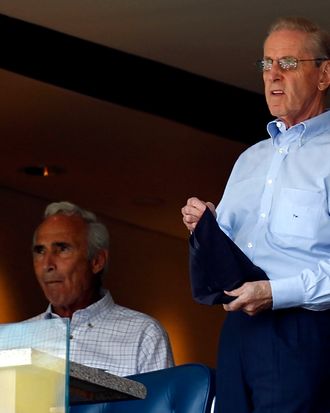
Lawyers for New York Mets owner Fred Wilpon and trustee of the Bernie Madoff victims Irving Picard argued a motion Friday before federal District Court Judge Jed S. Rakoff to dismiss the $1 billion lawsuit Picard has pending against Wilpon and his partners. Rakoff did not rule immediately, vowing to deliver a decision on the motion by the end of September. And that alone is a loss for fans of the Mets, a team that continues to labor under financial uncertainty as long as this case goes unresolved.
The highly illuminating two-hour hearing produced a set of likely outcomes, thanks to the far-from-shy Judge Rakoff. As Mario Cuomo, mediator in settlement talks between the two parties, said to a group of reporters just outside the courtroom, “Simply put, this was a very helpful exercise. Both sides know more about their positions than they did yesterday.”
Nothing is certain, of course — judges routinely play devil’s advocate. But Rakoff made it clear that he believes his own courtroom is a more appropriate forum for this lawsuit, rather than the bankruptcy court where Irving Picard was first appointed trustee.
That works in the Wilpon group’s favor — the burden of proof shifts more significantly to Picard. But everything else bodes ill for them. For instance, the judge’s decision to set a trial date of March 5, 2012 suggests that he foresees a reasonable chance he’ll let the suit proceed, promising additional months of costly legal fees for a cash-strapped Wilpon to pay.
And so with that in mind, let’s rank the possible outcomes from most likely to least likely:
Outcome No. 1: Rakoff lets the trial go forward, as-is. He leaves untouched both Picard’s pursuit of $300 million in fictitious profits — something that even Wilpon’s lawyers didn’t make much headway in disputing Friday, following a decision Tuesday by the Second Circuit Court of Appeals in Picard’s favor — and the $700 million Picard seeks to recover, a claim based on the idea that the Wilpons “knew or should have known” Madoff was a fraud.
Rakoff is likely, within his decision, to set the standard of proof for that $700 million claim, and his skepticism of the trustee’s proposed standard may work to Wilpon’s advantage. Picard’s lawyer David Sheehan repeatedly stated that owing to a number of red flags — for instance, a Wilpon partner suggesting they look into fraud insurance for their Wilpon holdings, or a suspect personal loan Madoff gave them in lieu of money from their account — that the Wilpons had a “duty of inquiry” concerning Madoff, and failing to do so made them responsible, financially.
Wilpon lawyer Karen Wagner, by contrast, argued for a “willful blindness” standard that would come closer to possessing actual evidence of fraud, something that will be far more difficult for Picard to prove. The higher that standard is, the more incentive Picard has to settle.
What would this outcome mean for the Mets? Another seven to eight months of legal proceedings that overshadow the baseball team (and that’s before the appeal!); the team checkbook is mothballed; and Jose Reyes opens 2012 at Fenway Park.
Outcome No. 2: The two sides reach a settlement. This could be driven by Picard deciding his chances of proving the case for the $700 million — the “known or should have known” part — is too risky before a jury. Or it could be driven by Rakoff removing that part of Picard’s complaint from the case himself, giving the sides reason to settle to avoid the cost of further litigation. (After all, if the floor is $300 million and the ceiling is also $300 million, the outcome is essentially foreordained.) Or it could be driven by raw Cuomo charisma.
The problem with reaching a settlement now is that following Tuesday’s Second Circuit decision, it looks like Picard’s floor for money he can get from the Wilpon group is $300 million. Whether or not that is also the ceiling may not matter much — it is highly unlikely that the Wilpons can raise those funds.
They’ve sold a minority stake (with the far more valuable majority option) for $200 million to hedge-fund manager David Einhorn, and all of that money goes out the door to pay a small portion of their outstanding debts the day it arrives. With their ownership stake in SNY compromised (as has been previously reported, any profit from the sale of that stake goes toward paying off their debt), it isn’t clear that they have assets that will allow them to pay. If bankruptcy is the result of a settlement, might as well go to trial, right?
What would this outcome mean for the Mets? A chastened Fred Wilpon sells his assets and turns the Citi Field keys over to David Einhorn, who promptly begins working to win back the fans.
Outcome No. 3: Rakoff dismisses the case altogether. If he does, Picard can simply appeal to the Second Circuit Court of Appeals — the same place that unanimously upheld his reasoning for asking the Wilpon group for $300 million. Rakoff didn’t seem interested in challenging that aspect of the suit, which makes sense — he knows how appeals work, too.
What would this outcome mean for the Mets? The Wilpons go on an “I told you so” tour while Picard appeals. The Appeals court almost certainly rules for Picard either in part (otherwise, it would be ruling against itself) or in whole. And David Einhorn, eventually, ends up with the majority stake in the team.